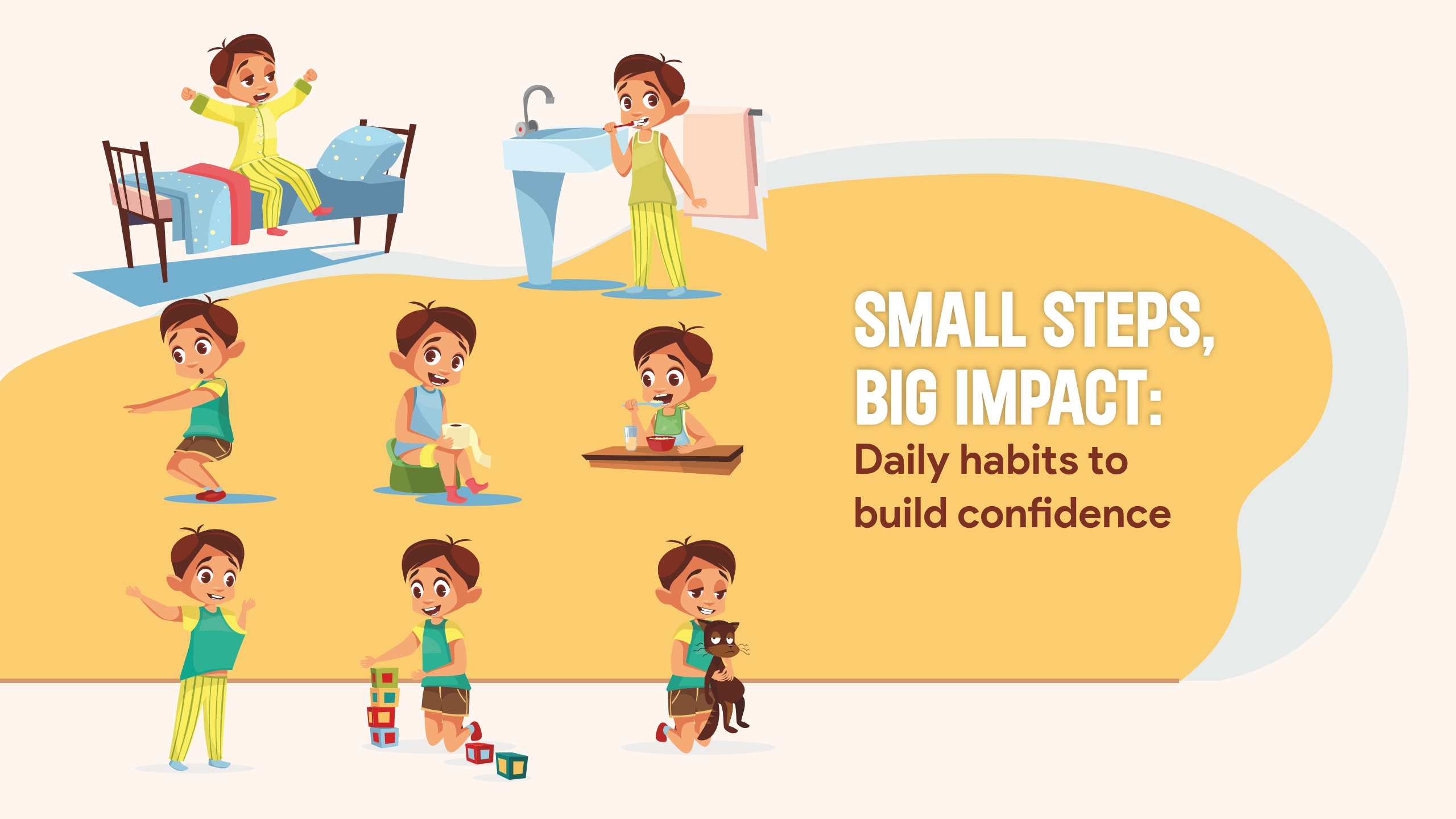Building self-confidence in children is akin to laying the foundation of a sturdy edifice; each small, consistent action contributes to a resilient and assured individual. For parents in India, nurturing these daily habits can significantly bolster a child’s self-esteem and overall development.
1. Begin with Positive Affirmations
Starting the day with positive affirmations can set a constructive tone. Encouraging children to verbalise their strengths fosters self-belief. For instance, guiding them to say, “I am capable of solving complex problems”, reinforces their confidence in their abilities. This practice aligns with findings from the School of Confidence, which emphasises the impact of morning affirmations on a child’s self-worth.
2. Cultivate a Growth Mindset
Encouraging a growth mindset involves teaching children that abilities can be developed through dedication and effort. This perspective helps them view challenges as opportunities rather than obstacles. Research published in the International Journal of Creative Research Thoughts highlights that self-confidence encourages risk-taking and innovation, essential for personal growth.
3. Promote Creativity
Engaging in creative activities allows children to express themselves and recognise their unique talents, thereby boosting self-confidence. A study commissioned by Crayola found that 92% of children believe that being creative helps them feel more confident. Encouraging activities like drawing, storytelling, or music can provide platforms for self-expression and confidence building.
4. Model Positive Behaviour
Children often emulate their parents’ behaviours and attitudes. Demonstrating self-confidence, resilience, and a positive outlook serves as a powerful example. According to the Times of India, fostering a child’s self-esteem is crucial in today’s competitive world, and parents play a significant role in this development.
5. Set Achievable Goals
Assisting children in setting and accomplishing small, realistic goals provides a sense of achievement and boosts self-confidence. Celebrating these successes reinforces their belief in their capabilities. This approach is supported by the Child Mind Institute, which notes that building confidence involves recognising accomplishments.
6. Encourage Physical Activity
Regular physical activity benefits not only physical health but also enhances mental well-being and self-esteem. Engaging in sports, yoga, or outdoor play can improve mood and provide a sense of accomplishment. The Hindustan Times suggests that fostering self-esteem involves promoting activities that enhance a child’s self-worth.
7. Foster Social Connections
Encouraging children to build healthy relationships with peers and family members provides emotional support and a sense of belonging. These social connections are vital for developing self-confidence and communication skills. For example, organising group activities such as team sports, collaborative classroom projects, or family game nights can help children develop social bonds. Encouraging open conversations at the dinner table or setting up playdates with classmates can also strengthen their ability to connect with others in a meaningful way.
8. Provide Constructive Feedback
Offering constructive feedback helps children understand areas for improvement while acknowledging their efforts. This balanced approach prevents discouragement and promotes a realistic self-image. The Times of India highlights the importance of positive reinforcement in boosting a child’s confidence.
9. Ensure Adequate Sleep
Adequate sleep is essential for emotional regulation and cognitive performance. Sleep deprivation can negatively impact a child’s mood, concentration, and self-esteem. Research from Parents.com indicates that lack of sleep affects overall mental health.
10. Teach Problem-Solving Skills
Empowering children with problem-solving skills enables them to tackle challenges independently, fostering confidence in their abilities. Encouraging critical thinking and solution exploration strengthens resilience and instils self-assurance. For example, if a child is struggling with a difficult maths problem, instead of giving them the answer, guide them through the thought process by asking questions like, “What do you already know about this problem?” or “Can you think of a similar problem you have solved before?” This approach helps them break the problem into manageable steps, explore different solutions, and build confidence in their ability to solve challenges independently.
At Narayana Schools, we understand the importance of nurturing these daily habits to build confidence in children. Our Soft Skills Programme plays a vital role in enhancing communication, leadership, and problem-solving abilities, empowering students to express themselves with clarity and self-assurance. Our holistic approach ensures that each student is equipped with the tools and support needed to realise their full potential. We believe that every small step contributes to the fulfilment and achievement of dreams because, at Narayana Schools, your dreams are our dreams.
Follow Us for More Educational Insights
Stay updated with the latest tips on education and student development. Follow us on Instagram for inspiring stories, engaging activities, and much more: Thenarayanagroup

This post hits home for me as a parent. I’ve noticed that when my child practices self-affirmation, they are much more willing to try new things. It’s amazing how these small daily habits can make such a difference.
Extremely motivation post for students as well as teachers.Very useful for leaving positive impact on the learners of all standards and age..